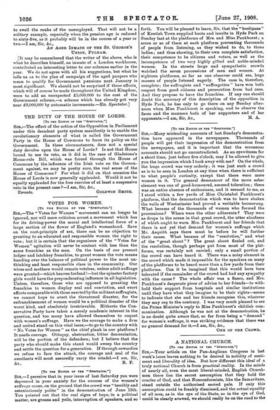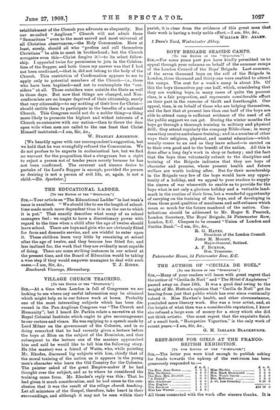A NATIONAL CHURCH.
[To THE EDITOR OF THE "ssiccveros."]
SIR,—Your article on the Pan-Anglican Congress in last week's issue leaves nothing to be desired in nobility of senti- ment and liberality of idea. But how different this ideal of a truly national Church is from practical reality. In the minds of nearly all, even the most liberal-minded, English Church- men there lies the secret assumption that they hold the oracles of God, and that Nonconformists, like the Samaritans, stand outside the authorised sacred pale. If only this assumption could be frankly dismissed, and the actual equality of all men, as in the eye of the State, so in the eye of God, could be clearly avowed, we should really be on the road to the
establishment of the Church you advocate so eloquently. But our so-called "Anglican" Church will not admit these " Samaritans " even to the most sacred and most universal of all Christian observances,—the Holy Communion. Here at least, surely, should all who "profess and call themselves Christians" be able to meet in brotherhood ; but the Church arrogates even this—Christ forgive it!—to its select fellow- ship. I appealed twice for permission to join in the Celebra- tion of the Supper, and both times my answer was that I had not been confirmed,—that is, did not belong to the body of the Church. This restriction of Confirmation appears to me to apply only to potential members of the Church—i.e., those who have been baptised—and not to contemplate the "out- siders" at all. Those outsiders were outside the State as well in those days. But now that things are changed, and Non- conformists are no longer deprived of their citizenship, surely that very citizenship—to say nothing of their love for Christ— should entitle them to participate in the benefits of a national Church. This Congress could not do a nobler thing—a thing more likely to promote the highest and widest interests of a Church co-extensive with our nation—than to throw the door open wide when men are called to the one feast that Christ Himself instituted.—I am, Sir, &c., W. STANLEY ANDERTON.
[We heartily agree with our correspondent's suggestion, but we hold that he was wrongfully refused the Communion. We do not profess to be experts in ecclesiastical law, but we find no warrant for the proposition that a clergyman has a right to reject a person not of tender years merely because he has not been confirmed. The reverent and sincere desire to partake of the Lord's Supper is enough, provided the person so desiring is not a person of evil life, or, again, is not a child.—ED. Spectator.]























































 Previous page
Previous page